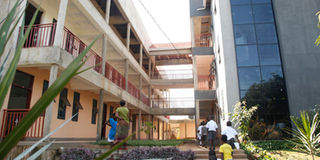The allure of private schools

Pupils walk to class at a private school in Kampala recently. Good infrastructure is one of the reasons, parents choose private school over most government aided ones. Photo by Rachel Mabala
What you need to know:
- Aside from bridging the education gap for the ever increasing population, private schools create jobs for surplus teachers who cannot be absorbed in government institutions.
The demand for private schools is rising even when the government offers free primary and secondary school education. Despite presence of Universal Primary Education (UPE) and Universal Secondary Education (USE), privately owned schools continue to offer a competitive alternative.
But it is not a Ugandan case alone. private schools are also becoming more common around the world. According to UN report, the portion of primary school students enrolled in non-government schools globally stood at 16 per cent in 2000. It had risen to 20 per cent by 2009.
Thwaib Nsereko, a parent at St Paul Secondary School, a private school in Kireka, Wakiso District, says sometimes, the closest government school is of low academic standard as evidenced by the quality of teachers, condition of the school infrastructure and students’ performance in exams.
“If a child intends to join university, they must attend a school with high academic standards. Therefore, the family might decide to send their child to a school they are sure will guarantee this. As is the case in the country today, there are high chances that that school will be privately-owned,” he says.
Infrastructure question
Often, government schools are criticised for high numbers of learners, which make it difficult for teachers to attend closely to all pupils. This, in turn, affects performance of the students in national examinations.
Stella Nandege, a parent at Gayaza Road Secondary School in Kyebando, Wakiso District, says most government-run schools have more than 60 pupils per stream. Occasionally, she says, a class may not even have a teacher at all. “We have seen where pupils in some rural government schools study under trees. In such a case, what would stop one from enrolling their child in a private school that has better infrastructure? As a parent, you must be wary about your child’s welfare at school and get out of your way to ensure they get a good education,” she said.
She adds: “Private schools have set a trend in infrastructural advancement in most of their institutions. It is one thing to have infrastructure and another to have functioning infrastructure. Most government schools structures are abandoned with no equipment. It is such flaws that make the establishment of the privately-owned schools inevitable.”
Alternative employment
Originally, teachers would be strictly employed in government-aided schools. Considering their number, there would be surplus of teachers looking for employment. Today, if a teacher cannot get a government job, they get one with a private school.
Allan Mbidde, the head teacher of Uphill Secondary School, a private school in Luteete, says the existence of private schools helps teachers produced by the various universities and teacher training colleges to get jobs.
“With the many teachers graduating every year, a big number of them would be left unemployed as there are only a few government schools. This means that a lot of expertise would be left roaming. It is initiatives such as starting up private institutions that can absorb them and utilise their potential,” he notes.
Mbidde adds that the competition paused by private schools prompts government schools to become competitive. “Private schools forced government institutions out of their comfort zone in a bid to ensure quality education making them a driving force to better education standards in the country,” he explains.
Regulation
According to Ismail Mulindwa, the assistant commissioner private schools in the Education ministry, despite mushrooming private schools, there must be an authority to control, regulate and coordinate their operations.
“The Education Act is clear about the Education ministry being responsible for coordinating, regulating and controlling education institutions in this country. We have specific guidelines, for example, on establishment of these schools but we have that big framework (the Act) which guides on how schools should be started, when where and by who and this is the framework that guides. However, it has got provisions,” he says.
He says they (ministry) are trying to come up with a specific policy on private schools because the Act is general (it looks at pre-primary, primary, secondary and universities both private and government).
“We have specific policies for specific areas or programmes such as licensing and registration. It is not the only thing we do with private schools. It is just one of the many things we do in there to guide the stakeholders on how to go about this. There are no specific frameworks for private schools per se. It is one general framework that caters for both private and government schools,” Mulindwa explains.
Classes
Private schools started operating as far back as the 1950s and the many government schools we see today such as Kisubi Secondary School, Mengo Senior School, Ndejje Secondary School, Kibuli Secondary School and Mt. St. Mary’s College, Namagunga, among others were originally private institutions. These are also classified under faith-based schools such as Bugema Adventists Secondary School, Seroma Christian High School and Gombe Secondary School, among others and secular schools such as Old Kampala Secondary School, St Mark’s College, Namagoma among others.




